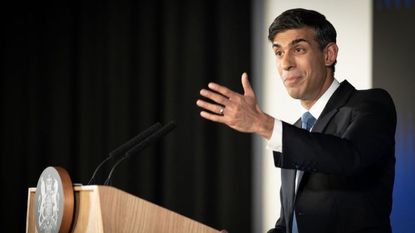Prime minister sets ambition of “maths to 18”
Rishi Sunak pledges to boost the country’s numeracy skills by requiring all school pupils in England to study some form of maths to age 18. This could include algebra and statistics, or financial literacy such as learning about mortgages and savings rates.


The prime minister has used his first speech of 2023 to set out his ambition for all schoolchildren in England to study some form of maths until the age of 18.
He said numeracy would become a central objective of the UK’s education system, and improving the nation’s skills was a government priority.
“One of the biggest changes in mindset we need in education today is to reimagine our approach to numeracy,” he said.
Subscribe to MoneyWeek
Subscribe to MoneyWeek today and get your first six magazine issues absolutely FREE

Sign up to Money Morning
Don't miss the latest investment and personal finances news, market analysis, plus money-saving tips with our free twice-daily newsletter
Don't miss the latest investment and personal finances news, market analysis, plus money-saving tips with our free twice-daily newsletter
“Right now, just half of all 16–19-year-olds study any maths at all. Yet in a world where data is everywhere and statistics underpin every job, our children’s jobs will require more analytical skills than ever before.”
Sunak likened this new focus on numeracy to the way the government had prioritised literacy since 2010, which had led to a significant improvement in standards.
The government does not plan to make maths A-Level compulsory. Instead, existing routes, such as the Core Maths qualifications and T-Levels, could be used, as well as more innovative options.
Sunak said studying a form of maths as a teenager would help them feel more confident with finances in later life, including “finding the best mortgage deal or savings rate”.
The prime minister’s speech highlighted five other pledges for 2023, covering the NHS and migrant boats, as well as inflation and the economy.
Why is Sunak focusing on numeracy?
The prime minister said he wanted to build a world-class education system, and as part of that it was essential to “reimagine” numeracy.
He highlighted the fact that just half of 16-19 year olds study any form of maths, and that the UK remains one of the only countries in the world that does not require children to study some form of maths up to the age of 18. This includes the majority of OECD countries, such as Australia, Canada, France, Germany and the USA.
About 8 million adults in England have the numeracy skills of primary school children, according to the government.
Today’s speech was Sunak’s first major intervention on education since becoming PM, and reflects his mission to ensure that more children leave school with the right skills in numeracy and literacy.
How will “maths to 18” work?
The scheme will involve a large reform to the education system - one that could be hampered by a lack of funding, and crucially, a lack of maths teachers.
There are few details so far. Sunak says he will start the work of introducing “maths to 18” during this parliament and finishing it in the next parliament. This means the scheme would not be introduced before the next general election.
The idea of compulsory maths lessons is unlikely to mean that all teenagers must study complex equations and topics like trigonometry.
Sunak referenced the need to be innovative, and reimagine our approach to numeracy.
He said: “‘Maths to 18’ will equip young people with the quantitative and statistical skills that they will need for the jobs of today and the future. This includes having the right skills to feel confident with finances in later life, including finding the best mortgage deal or savings rate.”
Ensuring the scheme teaches financial literacy
Experts have largely welcomed the prime minister’s announcement, with the caveat that teaching maths to 18 must reflect real-life situations, and boost the nation’s financial literacy.
Sam Sims, chief executive of National Numeracy, a charity, said: “We will be looking for the new policy to focus on developing the kinds of skills that everyone needs to apply maths to real-life problems, at work and in life.”
Research by National Numeracy shows that almost a third (30%) of 18- to 24-year-olds said using maths and numbers made them feel anxious.
Sims added: "Poor numeracy is holding the UK back. It blights lives and livelihoods, limits social mobility and contributes to pervasive problems from unemployment to poor health and debt. Improving numeracy offers benefits right across society.”
Richard Wilson, chief executive of the investment platform interactive investor, said: “Basic maths skills are essential. But while learning Pythagoras may be really useful for engineers and budding snooker players, our educators should focus on real-world skills for the many, so our next generation can invest in their future with a firm grip on the financial basics.”
Financial education is currently on the curriculum for state secondary schools in England (and more widely in the devolved nations), but many schools are academies or free schools, so do not have to meet this requirement. In addition, it is not part of the primary school curriculum in England.
Many financial experts and charities have been calling for financial education to be taught in primary schools, especially considering research shows that adult money habits are typically formed at age 7.
Bethan Lloyd, head of responsible wealth management strategy at the wealth manager Quilter, said: “Sunak's plan to make maths compulsory up to the age of 18 will only be effective if the curriculum gives students the practical skills they need for both work and life. Helping young children first learn about the merits of delayed gratification and saving, and then, as they get older, introducing more practical topics like pensions and mortgages, will give UK children and young adults a rounded financial education that will help them cope in times like these."
“Multiply” - a free maths programme for adults
Sunak mentioned in his speech how numeracy was a topic close to his heart, and as chancellor he had introduced the “Multiply scheme”.
Indeed, back in October 2021, he had unveiled a new national programme that would address poor numeracy skills among UK adults. Sunak said it would receive £560 million in funding over the next three years, giving thousands of adults free maths lessons and coaching.
The programme was supposed to launch in the spring of last year.
However, it does not appear to have launched yet, with the government website for Multiply still referencing that it will “launch this year”.
What schemes are available to adults wanting to improve their numeracy skills?
Many local authorities and private colleges run maths and numeracy courses for adults. Some charge a fee, while others are free. Course may be classroom-based, online, part-time or full-time.
You can search the National Careers Service for a course near you.
You can also watch bitesize videos on National Numeracy’s website and take its free numeracy challenge.
What else did the prime minister say in his speech?
Sunak made five pledges that he said would “provide peace of mind”. These include reducing NHS waiting lists, creating laws to stop migrant boats crossing the Channel, and a trio of economic-focused promises.
First, Sunak promises to halve inflation this year - currently running at 10.7% - to ease the cost of living. However, it is forecast to fall by more than half anyway.
Second, he promised to grow the economy, which will create jobs. Third, he pledged to ensure national debt is falling.
Ruth is passionate about helping people feel more confident about their finances. She was previously editor of Times Money Mentor, and prior to that was deputy Money editor at The Sunday Times.
A multi-award winning journalist, Ruth started her career on a pensions magazine at the FT Group, and has also worked at Money Observer and Money Advice Service.
Outside of work, she is a mum to two young children, a magistrate and an NHS volunteer.
-
-
 Investment trust discounts hit 2008 levels. Here’s how to profit
Investment trust discounts hit 2008 levels. Here’s how to profitInvestment trust discounts have risen to levels not seen since 2008, here are three trusts looking to buy to profit.
By Rupert Hargreaves Published
-
 A luxury stock to buy at a high street price
A luxury stock to buy at a high street priceInvestors wrongly consider Watches of Switzerland a high-street outlet.
By Dr Matthew Partridge Published
-
 August NS&I Premium Bond winners unveiled - have you scooped £1m?
August NS&I Premium Bond winners unveiled - have you scooped £1m?Two lucky NS&I Premium Bond winners are now millionaires in the August draw. Find out here if you are one of them
By Tom Higgins Published
-
 Savings rates more than double in a year as challenger banks top the best buy tables
Savings rates more than double in a year as challenger banks top the best buy tablesThe best savings rates have doubled - and in some cases tripled - in a year, with challenger banks offering the highest rates. While they are still no match for inflation, we look at what you could be earning.
By Ruth Emery Published
-
 Midlife MOT: what is it and who can get one?
Midlife MOT: what is it and who can get one?The government has launched an online midlife MOT to help older workers with financial planning, health guidance and career skills. But how does it work, who can get one and would you pass it?
By Ruth Emery Published
-
 Coventry Building Society launches new best easy access savings account
Coventry Building Society launches new best easy access savings accountCoventry Building Society's deal tops our easy access savings account list, but could your cash be put to better use?
By Tom Higgins Published
-
 NS&I boosts fixed-term savings rates
NS&I boosts fixed-term savings ratesThe NS&I, the government-backed savings institution has mirrored recent rate rises seen elsewhere in the market.
By Tom Higgins Published
-
 Should you let AI give you financial advice?
Should you let AI give you financial advice?Can AI fill the financial advice gap? Kalpana Fitzpatrick looks at the pros and cons of using AI to guide your finances.
By Kalpana Fitzpatrick Published
-
 Small pension pots to be consolidated, says DWP
Small pension pots to be consolidated, says DWPWorkplace pension schemes worth less than £1,000 that become “deferred” when a saver changes jobs will be consolidated under a new system
By Ruth Emery Published
-
 Watchdog summons banks to explain paltry savings rates
Watchdog summons banks to explain paltry savings ratesSavings rates trail mortgage rates - and the financial watchdog has summoned banks to a meeting amid concerns of profiteering.
By Katie Binns Last updated









